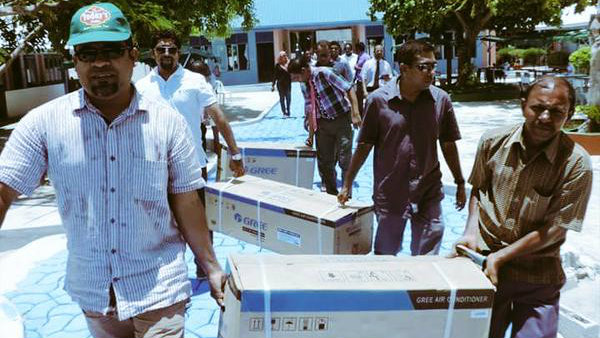Most shops, cafés and restaurants in the northern business hub of Haa Dhaal Kulhuduhfushi were closed in protest over electricity subsidy cuts on Sunday as anger builds among companies around the Maldives over steep rises in power bills.
Businessmen demonstrated in Addu City in the south, while others in Gaaf Dhaal Thinadhoo are preparing to boycott paying their bills, which in some cases tripled overnight when the subsidy was removed.
In Kulhuduhfushi, more than 100 shops and restaurants will be closed until 8pm Sunday in protest over “unfair electricity rates” and subsidy cuts, while more than 100 people have been protesting outside the office of electricity company Fenaka since this morning.
Shops would normally open from the early morning until 10pm.
“We will continue to raise our voice till the government is ready to listen to us,” said Adam Shareef, a member of the steering committee on electricity subsidy cuts in the island.
“We will continue our protest outside the electricity company till the government responds, but the shops will reopen tonight.”
The government has removed electricity subsidies to companies from last month onwards, while domestic households have been told to reapply for subsidies before April 9.
Businesses in Kulhuduhfushi, Addu and Thinadhoo have condemned the subsidy cuts and are also angry about the high price of electricity in the atolls compared with the capital, Male’ City.
Only a few shops were open in Kulhuduhfushi today, including the two state owned shops run by State Trading Organization and the businesses of Mohamed Zuhair, a well-known businessman in the atoll.
“I do support the cause and I think the differences in electricity prices are a gross discrimination between the peoples of the atolls and the people of Male’ City,” said Zuhair, also a member of the steering committee.
“But closing down all the shops without giving due warning to the public will not benefit them. That’s why all of my shops are open.”
Zuhair said one of his shops had previously received monthly bills of MRV 23,000 ($1,500) and these have now shot up to 60,000, while another store’s bill tripled from MVR 7,000 to MVR 21,000.
The difference in electricity prices between Male’ and the atolls is an issue of big public concern.
Prices in Haa Alif, Haa Dhaal, and Shaviyani atolls are 72 percent higher than in the capital, while those in Addu City and Fuvahmulak are up to 37 per cent higher than in Male’ city, according to figures from Fenaka Corporation, which provides electricity for most islands in the Maldives.
Mohamed Ismail, a local from Kulhuduhfushi, said: “We feel like we are second class citizens. The state is providing electricity for the islands as well as Male’.
“So why should there be any difference? Are we not worthy of being treated fairly?”.
Meanwhile a group of businessmen in Addu City in the south also protested over differences in electricity prices and the subsidy cut.
“Some businesses did not accept the electricity bills and today a number of businessmen protested outside the electricity company office,” said the mayor of Addu City, Abdulla “Sobe” Soadhig.
Businesses in Gaafu Dhaalu Thinadhoo, also in the south, have decided not to pay the electricity bill until the government reinstates subsidies or prices fall.
“We are in talks with the government to find a solution to this problem. But we cannot simply wait and hope for a government response,” said Abdulla Saneef, a Thinadhoo council member.
“The steering committee, which pretty much covers all businesses, has already decided not to pay the electricity bills.”
The government has previously said that the large distances between the Maldives’ remote islands mean that services such as electricity will inevitably be more expensive in the atolls.
The International Monetary Fund has urged the government to move its subsidies to a targeted system, rather than blanket payments.
Fenaka had not responded to queries at the time of going to press, while President’s Office spokesperson Ibrahim Muaz was unavailable for comment.
The government, presenting its 2015 budget, said that it would target electricity subsidies to the poor, while rumours have been circulating on the social media that households with air conditioning systems would not receive the domestic subsidy.
However, Mujthaba Jaleel, CEO of National Social Protection Agency (NSPA) said that “every household that applies for the subsidies will get it,” according to Haveeru.
Likes (4)Dislikes
(4)Dislikes (0)
(0) 


